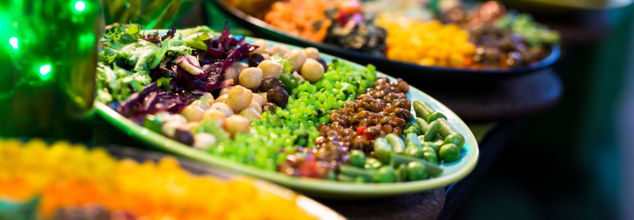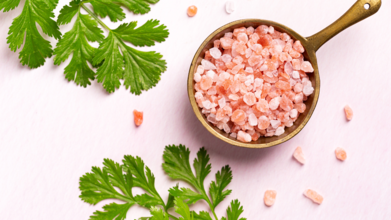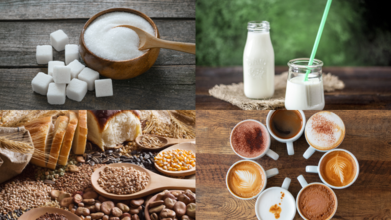- Health Conditions A-Z
- Health & Wellness
- Nutrition
- Fitness
- Health News
- Ayurveda
- Videos
- Medicine A-Z
- Parenting
- Web Stories
Vegetarian Diet Might Be The Answer To Reducing Cardiovascular Diseases

Vegetarian Food And Heart Health (Credit- Canva)
In recent years, there has been a surge in scientific research exploring the health benefits of plant-based diets. Current dietary guidelines now acknowledge the value of vegetarian and vegan diets in promoting overall health and preventing chronic diseases. Despite this growing body of evidence, many healthcare professionals still hesitate to recommend these diets. To bridge this gap, researchers have conducted comprehensive reviews to assess the impact of plant-based eating on cardiometabolic health. One of the studies was on type 2 diabetes and diet which was published in Advances in Nutrition, while the heart disease findings are published in the American Journal of Preventive Cardiology.
The Benefits of Plant-Based Eating
Plant-based diets, particularly vegetarian and vegan diets, offer a multitude of health benefits. Studies have shown that these diets can effectively manage blood sugar levels in individuals with type 2 diabetes, reducing the need for medication and improving overall metabolic health. Additionally, plant-based diets have been linked to a lower risk of heart disease by lowering cholesterol levels, reducing blood pressure, and decreasing inflammation. By incorporating a variety of plant-based foods, such as fruits, vegetables, whole grains, legumes, and nuts, individuals can reap the rewards of improved heart health.
How Plant-Based Diets Work Their Magic
The health benefits of plant-based diets stem from their unique nutritional profile. These diets are rich in fiber, which aids in digestion, promotes satiety, and helps regulate blood sugar levels. They are also excellent sources of unsaturated fats, which can help lower bad cholesterol levels and reduce the risk of heart disease. Furthermore, plant-based foods are packed with antioxidants, which help protect cells from damage caused by harmful free radicals. By consuming a diverse range of plant-based foods, individuals can ensure that they are meeting their nutritional needs and supporting optimal health.
Overcoming Misconceptions and Barriers
Despite the growing body of evidence supporting the health benefits of plant-based diets, many misconceptions and barriers still hinder their adoption. One common misconception is that plant-based diets are inadequate in protein. However, plant-based foods such as legumes, nuts, seeds, and whole grains provide ample protein to meet the body's needs. Another concern is that plant-based diets can be restrictive and bland. However, with a little creativity and planning, plant-based meals can be delicious, satisfying, and diverse. By addressing these misconceptions and providing practical guidance, healthcare professionals can empower individuals to make informed choices about their diet and improve their overall health.
Healthy Meal Idea For A Plant-Based Diet
Here are some delicious and nutritious meal ideas to inspire you on your plant-based journey.
Oatmeal with Berries and Nuts
A warm bowl of oatmeal topped with fresh or frozen berries, a sprinkle of nuts, and a drizzle of honey or maple syrup.
Salad with Grilled Tofu or Tempeh
A fresh and light lunch option with a variety of colorful vegetables, a protein-packed tofu or tempeh, and a light vinaigrette.
Vegetable Curry with Brown Rice
A flavorful and satisfying curry made with a variety of vegetables, lentils, and spices, served over brown rice.
Alia Bhatt Swears By Dal-Chawal, Not Salads: The Desi Vegan Diet That Could Transform Your Health

(Credit- Alia Bhatt/Instagram)
From her debut in ‘Student of the Year’, to her latest movie adventures like ‘Jigra’, Alia Bhatt is one of the most versatile actors in Bollywood and is well-liked celebrities in India. In an ‘Aap Ki Adalat’ interview a few years ago Bhatt revealed that one of the major components of her diet is no sugar.
She expressed how she needed a variety of dishes, calling herself full ‘desi’. Another surprising thing she revealed was that she didn’t understand or like salads and prefers ‘Daal Chawal’ which is rice and lentil soup filled with whole grains and vegetables. She also mentioned that her choice of breads was roti made with ragi grains, jawar and other millets.
Is Rice And Lentil Soup A Weight Loss?
Although people expect Bollywood starlets to enjoy rich and nutritious salads, Alia Bhatt’s refreshingly desi home diet bring about the discussion of whether one needs diet food or just needs to understand their nutritional needs better. Dal and rice are a perfect combination of carbohydrates, protein, and essential nutrients. To get the most nutritional benefit from this classic pairing, it's a good idea to make a few simple tweaks.
- Don't just rely on white rice. Try incorporating whole-grain varieties like brown, red, or black rice into your meals to add more fiber and antioxidants.
- Add vegetables, herbs, and spices to your dal to make it more nutrient-rich.
- Mix peas or beans into your rice. They are full of fiber and antioxidants, which can help improve blood sugar, cholesterol, and blood pressure.
- Pair your meal with a side. Serving your dal-chawal with yogurt adds healthy bacteria for your gut, while a fresh salad provides more vitamins and fiber.
- Balance your plate. A simple way to eat mindfully is to follow a "MyPlate" approach. Fill half your plate with fruits and vegetables, and divide the other half between a protein (like meat or fish) and a grain (like white rice).
Why You Should Eat Ragi, Jawar And Other Millet Rotis
Instead of regular wheat rotis, try healthy grains like ragi and jowar. These millets are packed with nutrients that can do wonders for your health.
Ragi is an excellent source of calcium and iron, which are essential for strong bones and healthy blood. Its high fiber content also helps with digestion, weight management, and stable blood sugar.
Jowar is loaded with protein, fiber, and antioxidants. It's great for digestion, can help with weight loss, and also lowers cholesterol for a healthier heart.
A 2024 study in Frontiers in Nutrition journal explained that adding more millets to your diet is a smart decision as they contain a great mix of carbohydrates, protein, fat, and fiber. They have more essential amino acids than common cereals, and their protein is easier for the body to digest.
While millets have always been a staple food, recent studies are highlighting their impressive medicinal properties. Eating millets has been scientifically shown to help with:
- They have a type of starch that digests slowly, which prevents blood sugar spikes.
- Millets can help you feel full and satisfied, aiding in weight loss.
- Regular consumption can reduce the risk of heart disease.
- Millets are naturally gluten-free, making them an ideal food for people with celiac disease.
Is A Sugar-Free Diet Actually Healthy?
Cutting out added sugar and focusing on whole foods can have a great impact on your health. It can help you manage your weight, lead to clearer skin, and improve your mood. It also helps reduce inflammation and lowers your risk of developing type 2 diabetes.
However, it's important not to confuse added sugars with the natural sugars found in fruits. Fruits provide essential nutrients like fiber and antioxidants. You can still have a very healthy diet by including whole fruits.
Remember, a no-sugar diet isn't a magic fix for weight loss. It's just one part of a healthy lifestyle that should also include exercise and a balanced diet. If you're thinking about making a big change to your diet, it's a good idea to talk to a doctor or dietitian first.
Ditch The Pink Salt Trick Recipe, Try These 4 Drinks Instead To Support Your Weight Loss Journey

Credits: Canva
Social media platforms have introduced many of us to hacks and trends that promise quick fixes for health and wellness. Some of them are harmless fun, but others can spread misinformation and lead to unhealthy habits. One such viral trend is the Pink Salt Trick Recipe, a drink made from pink Himalayan salt, lemon juice, and water, which is being promoted as a shortcut to fat loss and a “metabolism reset.”
But can sprinkling some pink salt into water really help you drop weight? Let’s unpack the facts and explore healthier alternatives that actually support your wellness journey.
Can You Lose Weight with the Pink Salt Trick?
The short answer is no. Despite claims circulating on TikTok and YouTube, often boosted by AI-generated celebrity deepfakes, there is no scientific evidence that pink salt speeds up fat burning, “melts fat,” or resets metabolism.
In fact, experts warn against overconsumption of pink salt. Unlike iodized table salt, pink salt contains little to no iodine, which could potentially disrupt thyroid health if used as your primary salt source. Excess sodium can also increase blood pressure and cause bloating, which is the opposite of what most people are hoping for when they try to lose weight.
Missouri State University’s investigation with registered dietitian Natalie Allen confirmed: “Pink salt does not speed up metabolism, detox the body, or cause weight loss.”
Healthy Drink Alternatives That Actually Support Weight Loss
While no single drink can magically make fat disappear, some beverages can boost metabolism slightly, reduce cravings, and support better digestion, all of which help your weight-loss efforts when paired with a healthy lifestyle. Here are four expert-approved options:
Green Tea
Packed with catechins, powerful antioxidants, green tea can slightly boost calorie expenditure and fat oxidation. It’s a popular pre-workout drink because it provides a mild caffeine kick without the jitters of coffee.
Apple Cider Vinegar Drink
A teaspoon of apple cider vinegar in a glass of water before meals may promote a feeling of fullness and stabilize blood sugar levels. Just make sure to dilute it well to avoid damaging your teeth or irritating your stomach.
Protein Smoothies
Blending a scoop of protein powder with unsweetened almond milk, spinach, and berries can keep you full for hours, reduce snacking, and support muscle maintenance, which is key for a healthy metabolism.
Ginger and Lemon Water
Ginger aids digestion and reduces inflammation, while lemon adds vitamin C and a refreshing flavor. Together, they make a hydrating drink that can be sipped throughout the day to curb unnecessary cravings.
Risks and Caution
Even with these healthier drinks, overconsumption can cause issues like bloating, digestive discomfort, or nutrient imbalances if you replace whole meals with beverages. Some ingredients, like caffeine or apple cider vinegar, may also interact with medications or cause irritation if taken excessively.
No Magic Shortcut
Drinks can support your weight-loss journey, but they cannot replace the fundamentals: a balanced diet, regular exercise, adequate sleep, and stress management. Use beverages like green tea or ginger water as helpful tools, not as miracle solutions.
Disclaimer: Weight loss is a gradual process and cannot be achieved by drinking one special beverage. The drinks mentioned here can help with metabolism, digestion, and reducing cravings, but long-term results require consistency with physical activity, balanced nutrition, and overall lifestyle changes.
Sadhguru Says These 4 Foods Are Like Slow Poison For Your Body

Credits: Canva
Good health isn’t just about eating the right foods, it’s also about knowing what to avoid. Spiritual leader, Sadhguru, often emphasizes that certain foods we consume every day can silently harm our bodies over time. He calls them “enemies of health” and advises limiting or completely avoiding them.
Refined Sugar
According to Sadhguru, sugar as we consume it today is not the same as what our ancestors ate. Traditionally, sweeteners came from natural sources like jaggery or unrefined sugarcane juice. Modern white sugar, however, is highly processed and stripped of vitamins and minerals, leaving behind only “empty calories.”
Also Read: International Fetal Alcohol Syndrome Day 2025: Themes, Significance And History
Excessive sugar intake has been linked to obesity, diabetes, and heart disease. Sadhguru points out that it not only adds to weight gain but also weakens the immune system and disrupts the body’s natural balance. Choosing natural sweeteners like jaggery, honey, or fruits can be a healthier alternative.
However, Dr Palaniappan, who runs his YouTube channel under the name Dr Pal, a gastroenterologist says that jaggery or sugar do not really have that much of a difference. He explains that while 2 teaspoon of sugar have 8 grams of carbs, 2 teaspoon of jaggery have 6 grams of carbs. The difference is not that much, if your carbohydrate consumption is 200 grams per day. However, he does note that jaggery has a lower sugar spike.
Milk
While milk is often marketed as a superfood, Sadhguru suggests that most adults are unable to digest it properly. Many people lack the enzymes required to break down lactose, which can lead to bloating, mucus formation, and lethargy.
Although milk is a good source of calcium, Sadhguru recommends relying on other calcium-rich foods such as leafy greens, sesame seeds, ragi (finger millet), and nuts. Limited milk consumption is fine for those who tolerate it, but he advises against making it a daily habit for everyone.
The Physicians Committee for Responsible Medicine quotes Harvard Study that followed 72,000 women for two decades and found no evidence that drinking milk can prevent bone fractures or osteoporosis. The conclusion was milk does not necessarily build the strongest bones, though this is not to say that it has no nutrients. In fact, an estimated of 65% of the global population is lactose intolerant, majority of whom are from Asia.
Also Read: Kissing Bugs Disease Could Soon Become An Endemic, Says CDC
Refined Grains
Modern refining processes remove the outer bran and germ from grains, leaving only the starchy endosperm. This process makes the grains last longer on shelves but takes away most of the fiber, vitamins, and minerals. As a result, refined grains like white rice and maida (white flour) provide little nutrition and cause rapid spikes in blood sugar.
Sadhguru encourages the consumption of whole grains such as brown rice, millets, and whole wheat to promote better digestion, sustained energy, and improved gut health.
Tea and Coffee
Tea and coffee may be morning essentials for many, but Sadhguru cautions against their overuse. These beverages act as nervous stimulants, giving a quick burst of energy but leaving the body more tired later. Habitual consumption can lead to dependency, sleep disturbances, and heightened stress levels.
He recommends gradually reducing intake and replacing these drinks with herbal teas, fresh juices, or simply water to maintain natural energy levels throughout the day.
© 2024 Bennett, Coleman & Company Limited

